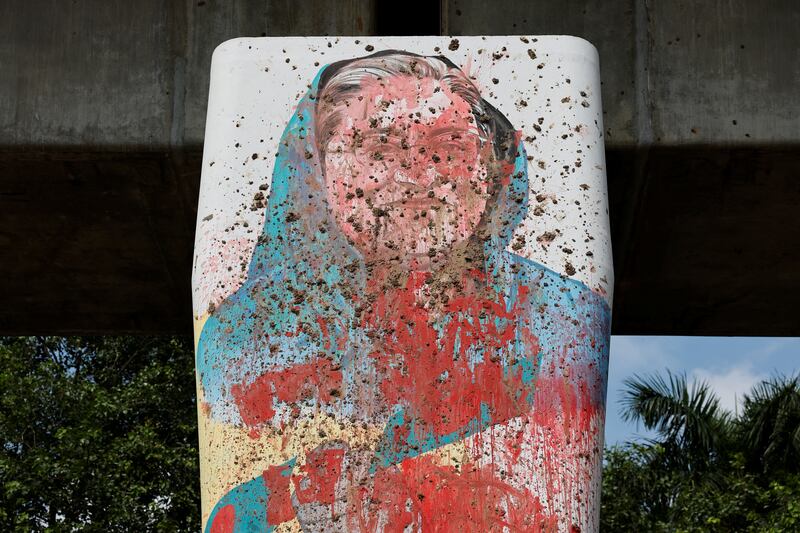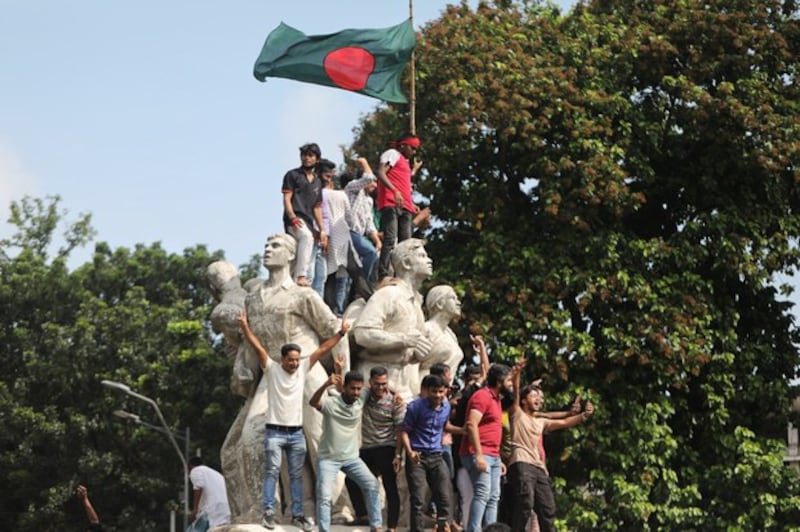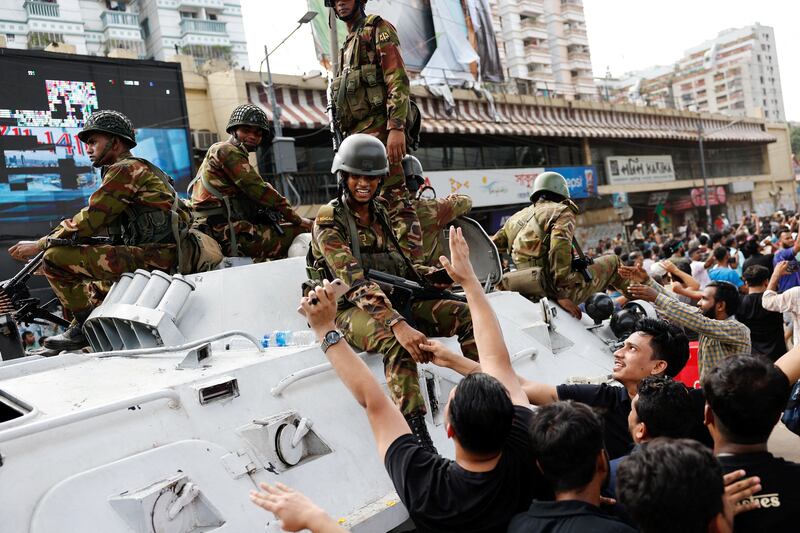UPDATED at 7:49 p.m. ET on 2024-08-05
Bangladesh’s Sheikh Hasina on Monday resigned as prime minister and fled the country following a student protest that turned deadly and became a mass movement demanding she step down.
Chief of Army Staff Gen. Waker-uz-Zaman confirmed Hasina’s resignation at a press conference and said that after discussions with representatives of major political parties and civil society groups, it had been decided an interim government would be constituted.
“The prime minister has resigned. An interim government will be formed to run the country,” the army chief said.
“I take all responsibility ... justice [is] to be ensured for every killing and other misconduct,” he said, adding that he had ordered the police and security forces not to fire on the protesters.
Last month, what began as protests against extensive quotas in civil service jobs spiraled into deadly clashes claiming at least 212 lives when police and supporters of Hasina's Awami League party joined the fray in an attempt to quell the university students' demonstrations.
Amid the protests, the Supreme Court's appellate division on July 21 slashed those quotas to 7% from 56%, paving the way to make most government jobs merit-based in the country with a high unemployment rate among young people.
That did not appease the students who demanded justice for those who were killed. They alleged unprovoked attacks on peaceful protesters by police and members of the student wing of Hasina's Awami League party. The government, in turn, accused the opposition of fomenting the violence.
But, as one, international bodies and rights groups such as the United Nations, Amnesty International and others expressed shock at what they called a government crackdown and efforts to suppress popular discontent. The United States condemned the violence, saying it supported "peaceful assembly." And the European Union said there needed to be full accountability for the "use of excessive and lethal force by the law enforcement authorities against protesters."
At least 98 more lives were lost Sunday, the deadliest day of the civil unrest in what had now become a nationwide mass movement, with protesters demanding that Hasina and her government resign taking responsibility for the deaths.
Analysts had said the protest movement had broadened into an indictment of Hasina's nearly 15 consecutive years at the helm of the South Asian nation, a reign marked, they said, by the crushing of dissent in a bid to consolidate power.
Hours after the 76-year-old Hasina left Bangladesh, President Mohammed Shahabuddin’s office issued a statement saying he had “decided to unanimously free” imprisoned ex-prime minister and opposition Bangladesh Nationalist Party (BNP) leader Khaleda Zia, Hasina’s archrival.
A three-time prime minister, Khaleda has been effectively under house arrest for corruption convictions, even as the Awami League administration consistently rejected BNP's requests to seek medical care for her abroad.
BNP Secretary General Mirza Fakhrul Islam Alamgir said the decision to free Khaleda was made after a meeting held by the president with the army chief and representatives of various parties.
Mirza also said that it was decided that the “parliament will be dissolved and an interim government will be formed soon.”
Additionally, student leaders and activists imprisoned since July 1, will be released, he said.
“It has also been decided that all political parties and student leaders will work to bring the law and order situation under control,” Mirza said at a press conference.
Deadly clashes continued though on Monday, with at least 54 people killed in Dhaka and other districts around the country, according to a tally of figures provided by officials at hospitals in these places.

‘New Independence’
Meanwhile, Hasina, who had fled with her younger sister Sheikh Rehana, stopped at an airport outside New Delhi, where Indian National Security Advisor Ajit Doval went to meet with the former leader. Details of the meeting were not disclosed.
And nor was it immediately clear where Hasina was headed, although several Indian diplomatic sources told the Press Trust of India, the state news agency, that she was headed for London.
Rozina Akhter, the guardian of a student protester from the Residential Model College, called Hasina’s resignation a triumph for the people of Bangladesh.
“This is a new victory for us. New Independence,” Rozina told BenarNews. “[Hasina] wanted to dictate [to] Bangladesh. But people have taught her a lesson.”
Thousands of jubilant Bangladeshis stormed and raided Hasina’s residence Ganabhaban upon hearing the news of her resignation, with photographs showing crowds jumping into the pool in the mansion’s complex and relaxing in plush chairs inside the residence.
Unrestrained by army and security personnel, dozens climbed to the top of Ganabhaban and waved the Bangladesh flag. Some also took out items from Hasina’s former residence, including books and photos, as others vandalized the vehicles parked in the driveway as well as outside the residence.
Another crowd headed for the national parliament and the prime minister’s office, with euphoric protesters chanting, “Hasina has fled, Hasina has fled,” as they flashed victory signs in front of the buildings.

Sabbir Ahmed Khan, the parliament security chief, told BenarNews Monday night that the crowds ransacked the parliament building, or the Jatiya Sangsad.
“Thousands of protesters have entered the Jatiya Sangsad building and looted everything they got. They ransacked the library,” he said.
In the Dhanmondi neighborhood in Dhaka, crowds set fire to the Bangabandhu Memorial Museum, the founding President Sheikh Mujibur Rahman’s old residence that had been converted into a national monument.
Mujibur, Hasina’s father, and most the family’s members were assassinated in a 1975 coup. Hasina and her sister were abroad at that time. Hasina formally took over the Awami League six years later after a brief exile abroad.
Hasina recently won her fourth consecutive general election – allegations of massive vote rigging had hounded her through all the polls.
Under her administration, local and international advocacy groups have documented mass arbitrary arrests, enforced disappearances, torture, extrajudicial killings, and widespread repression.
Jesmin Akhter, a citizen who participated in the protests, said Hasina’s excesses during her rule are what led to the current situation.
“She is a dictator. …The democracy-loving people have forced her to flee,” she told BenarNews from inside the former PM’s residence.
“This is a lesson for our future rulers.”
Muhammad Billal, a student of Daffodil University, said Hasina had been beaten.
“This is a people’s victory,” he told BenarNews.
More violence
However, while many celebrated, the situation in the South Asian nation of 170 million people remained in flux, with army personnel deployed at different strategic points of Dhaka to stop potential clashes with the ruling party members.
Protesters attacked houses and business establishments of minority Hindus, officials said, reporting such incidents nationwide – in Brahmanbaria, Sirajganj, Jhalakathi, Chattogram, Noakhali, Cumilla, Rajbari, Faridpur, Bogura and Sylhet.
Ranjit Roy, an employee at a private farm in Dhaka, told BenarNews he and his family were very worried.
“The residence of my father-in-law in Gournadi has been smashed. We are really in trouble,” he said.
Elsewhere in the country, statues of Mujibur Rahman were torn down in Tejgaon, Faridpur and Rajbari. Crowds could also be seen attacking media companies’ buildings.
Earlier, at the press conference announcing Hasina’s resignation, the Army chief said that students and politicians must now help the Bangladesh Army maintain peace.
“Our country is suffering, economically, our infrastructure is suffering, help the army in these remedies,” Gen. Waker-uz-Zaman said.
The army’s Inter-Services Public Relations Department said in a notification that the army chief would soon hold a direct discussion with all students and teachers’ representatives.
BNP Chairperson Khaleda Zia and Acting Chair, Tarique Rahman who’s in exile in London, also urged Bangladeshis to remain calm amid the ongoing political turmoil.
Global reactions
Internationally, the United States, the European Union and the United Nations secretary-general called for calm in Bangladesh, even as they said there must be accountability for those killed.
The U.S. on Monday again condoled the deaths, said Matthew Miller, State Department spokesman, at a daily press briefing.
It was vital that “full and transparent investigations to ensure accountability for these deaths” takes place, he said.
“We welcome the announcement of an interim government and urge any transition be conducted in accordance with Bangladesh’s laws.”
He also had words of praise for the Bangladesh Army.
"We have seen reports that the army resisted calls to crackdown on protesters and if these are true that is a positive development," Miller said.

Washington and Dhaka have had strained relations in recent years.
An announcement by the U.S. last September that it would deny visas to Bangladeshis whom it suspects of trying to undermine democratic elections has rattled many in the South Asian nation.
In May, the U.S. State Department imposed sanctions on former Bangladesh Army chief Gen. Aziz Ahmed and his immediate family members due to his alleged involvement in corruption.
The U.S. Treasury Department in December 2021 sanctioned Bangladesh’s elite security force, the Rapid Action Battalion (RAB), and several of its current and former officers for alleged human rights abuses, including extrajudicial killings.
In April last year, U.S. Secretary of State Antony Blinken urged Bangladesh to commit to democratic norms, good governance, human rights, and media freedom, while congratulating the country on its Independence Day.
Displeased at what appeared to be a rap on the knuckles, Hasina reacted by saying in the parliament that Washington was working to bring an undemocratic party to power in Bangladesh in the upcoming election.
‘Will not accept army-backed government’
The Student Movement against Discrimination, which had spearheaded the anti-quota protests, said on Monday night that Hasina’s resignation was just the first step towards victory.
The movement’s coordinator Nahid Islam said at a press conference that as their second step, the students would propose in 24 hours an outline of what the national government must look like.
Later, they announced in a video statement that they would present the name of Hasina’s nemesis, Nobel laureate Muhammad Yunus, as a chief adviser to the interim government and that he had accepted their proposal.
Yunus could not be immediately reached for confirmation that he had accepted the proposal. In recognition of his pioneering micro-credit loans that helped Bangladeshi people – women in particular – lift themselves out of poverty, he was awarded the Nobel Peace Prize in 2006.
Hasina and her Awami League believed that Yunus used his friendship with former U.S. Secretary of State Hillary Clinton to pressure the World Bank to withdraw funding for the vaunted Padma Bridge, which Bangladesh eventually built with its own money and inaugurated with much fanfare on June 25. He denied the allegation.
Since then, though, has faced at least 30 income tax and labor-related cases, one of his lawyers, Abdullah Al Mamun, told BenarNews in May last year.
Nahid, meanwhile, was clear about what the university students did not want to see.
“The movement will not accept any army-backed government,” Nahid said.
“Nor a government run under an emergency with the president.”
RELATED STORIES
[ 2 killed as Bangladesh protests swell; demands grow for PM Hasina’s resignationOpens in new window ]
[ Bangladesh: Hasina meets with families of the dead as arrests continueOpens in new window ]
[ Night-time police raids spread fear across Dhaka in unrest aftermathOpens in new window ]
[ Relatives fight bureaucracy to claim bodies after Bangladesh clashesOpens in new window ]
